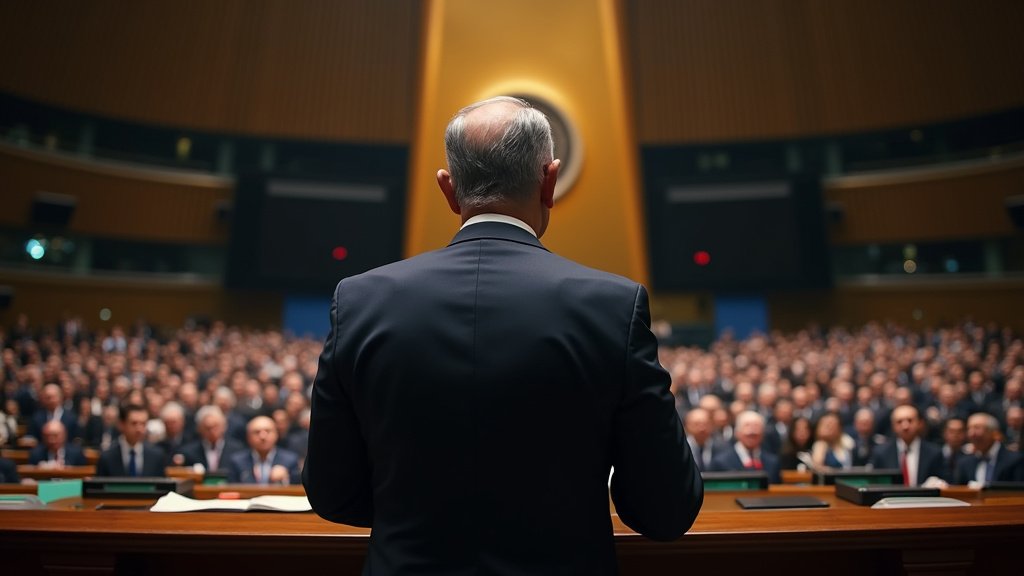UNITED NATIONS – Israeli Prime Minister Benjamin Netanyahu delivered a defiant speech at the United Nations General Assembly on Friday, September 26, 2025, vowing to “finish the job” against Hamas in Gaza amidst escalating international condemnation and a significant diplomatic isolation. The address was punctuated by a mass walkout of dozens of delegates from numerous nations, signaling the deepening chasm between Israel’s current leadership and the global community.
As Netanyahu took the podium, signaling the start of his address to the 80th session of the General Assembly, a substantial number of diplomats rose from their seats and exited the hall in protest. This act of dissent, replicated from previous years but notably larger in scale this time, underscored the widespread international opposition to Israel’s nearly two-year-long military campaign in Gaza. Over a hundred delegates from more than 50 countries participated in the walkout, according to reports. The U.S. delegation, a key ally, remained in their seats, offering a visible point of support amidst the growing isolation.
Netanyahu’s speech was largely a forceful rejection of the mounting international pressure, including calls for a ceasefire and increased humanitarian aid to Gaza. He castigated Western leaders for what he termed a “disgraceful decision” to recognize an independent Palestinian state, asserting that such moves would “encourage terrorism against Jews, and against innocent people everywhere.” He claimed that while “Western leaders may have buckled under the pressure,” Israel “won’t.” The Prime Minister also accused his critics of propagating “anti-Semitism and libelous lies,” a recurring theme in his public discourse. He further announced an “unprecedented operation” where the Israeli army would broadcast his speech live through the mobile devices of Gaza residents and Hamas operatives.
This global confrontation at the UN followed a significant diplomatic development in the preceding week: a wave of recognitions of an independent Palestinian state by several prominent Western nations. France, the United Kingdom, Australia, Canada, Portugal, Luxembourg, Malta, Monaco, and Belgium were among those that formally recognized Palestinian statehood, a move aimed at preserving the possibility of a two-state solution. Prime Minister Netanyahu immediately condemned these actions, labeling them a “shameful capitulation” and a “reward for terrorism,” while asserting that Israel would not be bound by these decisions and “there will be no Palestinian state.”
The news comes as the human cost of the conflict in Gaza continues to mount. As of late September 2025, casualty figures reported by Gaza’s Ministry of Health indicate over 65,400 Palestinians have been killed and more than 167,000 injured since October 2023, with an estimated 80% of fatalities being civilians. Humanitarian conditions remain catastrophic, with widespread displacement and confirmed famine in Gaza City, while access to essential aid is severely limited. Reports also highlighted a growing number of malnutrition-related deaths among children.
On the diplomatic front, the European Union is actively considering new measures against Israel. These include potential sanctions on “extremist Israeli ministers” and settlers, and a possible suspension of the EU-Israel Association Agreement. EU leaders have characterized the situation in Gaza as a “humanitarian catastrophe.”
While the United States delegation remained during Netanyahu’s speech, U.S. public opinion on the conflict is reportedly shifting, with polls indicating growing concern over Israel’s military response. President Donald Trump, a key ally of Netanyahu, publicly stated that he “will not allow” Israel to annex the occupied West Bank, though the practical enforcement of this stance remains uncertain.
Palestinian leader Mahmoud Abbas, addressing the UN General Assembly via video link the day before Netanyahu’s speech, welcomed the increased recognition of Palestine and urged the international community to support their “legitimate rights.” The events at the UN General Assembly reflect an increasingly polarized international landscape, with Israel facing significant diplomatic isolation and mounting calls for a fundamental shift in policy regarding the ongoing conflict in Gaza. The trending narrative in global diplomacy continues to be shaped by these deeply entrenched positions and the urgent humanitarian crisis unfolding on the ground.




